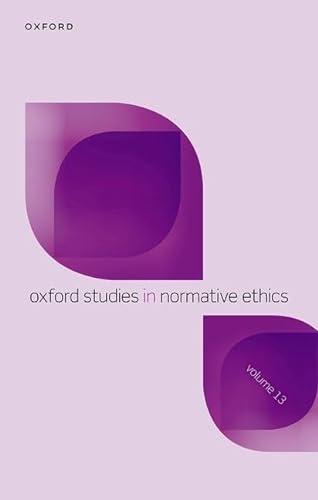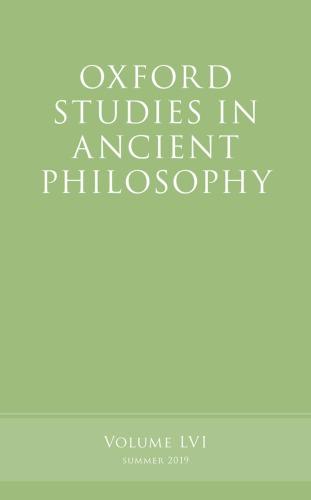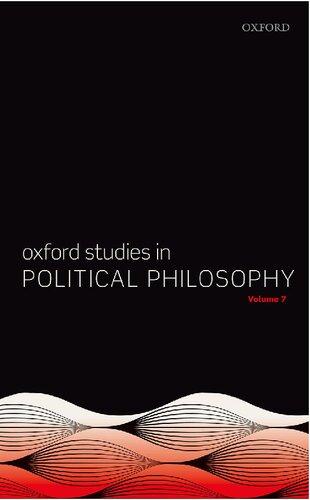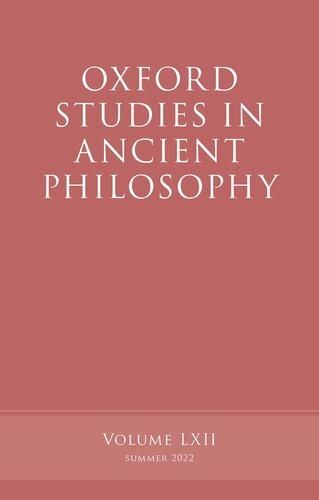Introduction
MarkTimmons
OxfordStudiesinNormativeEthics featuresnewworkontopicsinnormativeethicaltheory.Thisthirteenthvolumefeatureschaptersonthefollowing topics:paradoxicalproposalsandconsent,manipulationandautonomy, moralindifference,thevalueofpersons,moraltheoryandcoherence,a contractualistapproachtomoraluncertainty,normativeexpectationsand practicalidentity,satisficingandvirtueethics,protantorights,problems withsavingthemany,virtueandconsequences,andthenatureofmoraland politicalrights.
Aparadoxicalproposal,asexplainedby TomDougherty in “Paradoxical ProposalsandConsent,” isoneinwhich(i)anagentwrongsadeliberatorby proposingtorefrainfromperforminganactionAunlessthedeliberator choosesanoption(ii)eventhoughitwouldnotbewrongfortheagentto performA.Howisthedeliberatorwrongedinsuchcaseswhentheagentis notproposingtodosomethingwrongshouldthedeliberatorrefuseto choosetheoption?Forinstance,CitizenknowsthatCriminalcarriedout theheistandthreatenstoturnCriminalintotheauthoritiesunlessCriminal paysCitizenoff.ThequestionDoughertyaddressesinhischapteriswhich paradoxicalproposals(ifany) “constrainadeliberator’schoicesinawaythat invalidatesconsentthatisgivenbecauseoftheseproposals?” Insomecases ofconcernproposals introduce adisincentiveforthewould-bevictim,thus worseningthevictim’schoicesituation.IfCitizenwouldnototherwiseturn inCriminal,herproposalintroducesadisincentive.Insuchcasesconsentis invalidated.However,asDoughertypointsout,thereareotherparadoxical proposalsthatdonotinvalidateconsentyetstillwrongtherecipientof theproposalby,e.g.,takingadvantageoftheperson’svulnerabilityvia independent disincentives,i.e.,disincentivesthatarenotbroughtaboutby theproposal.Doughertyholdsthatthetwodifferentkindsofparadoxical proposalcallforatwo-prongedapproach.Hisapproachtocasesinwhich theproposalintroducesadisincentiveforthedeliberatortocomplyisthat theirconsentisinvalidatedbecausetheyhaveavalidclaimnottohavetheir MarkTimmons, Introduction In: OxfordStudiesinNormativeEthicsVolume13.Editedby:MarkTimmons, OxfordUniversityPress.©MarkTimmons2023.DOI:10.1093/oso/9780198895909.003.0001
choicesituationworsened.Fortheothertypeofcaseinwhichthedeliberator’sconsentisnotinvalidated,weretheagenttoactontheproposalthey maystillwrongthedeliberatorbywrongfullytakingadvantageoftheir situation,settingbackanimportantinterestoftheirs.Since,asDougherty pointsout,thetwoprongsofhisapproachareindependent,eitherofthem couldbeacceptedwhilerejectingtheother.
Manipulationeitherreliesoninfluencingsomeone’snon-deliberative psychologicalmechanisms(e.g.,playingonsomeone’sguilt)oritrelieson somemeansoftrickery(e.g.,lying).In “Manipulation,Disrespecting Autonomy,andDeliberativeProjects,” RonAboodi and ShlomoCohen explorethepracticalmeaningofdisrespectingaperson’sautonomyby focusingonhowsuchdisrespectresultsfrommanipulation,withtheparticularaimofilluminatingthenotionofautonomy.Theytaketheobjectof suchdisrespecttobewhattheycall “themanipulee’sdeliberativeproject” understoodasone’ s “interrelatedongoingeffortstomanageherconductby committingtonormativestances,ideals,policies,plans,goals,andthelike.” Disrespectingamanipulee’sdeliberativeprojectishowtheyproposeto precisifydisrespectingaperson’sautonomy.Theyproceedbyconsidering intuitionsaboutcasesofmanipulation.Beforeturningtotheirownaccount, AboodiandCohenconsidervariousaccountsofthewrongnessofmanipulationintheliteratureand findthemwantingasprecisificationsofdisrespectingamanipulee’sautonomyinyieldingintuitivelyincorrectverdicts whenmanipulationdoesdisrespectamanipulee’sautonomy.Although,as theynote,therearevariouswaysofdisrespectingsomeone’sautonomy,they focusonintentionallyinterferingwithit(andriskingsuchinterference), arguingthatwhetherpaternalisticallymotivatedornot,disrespectingsomeone ’sautonomyisthemosttypicalprotantowrong-makingfeatureof manipulation.Theauthorsconcludebyconsideringboththeoreticaland practicalimplicationsoftheirview.
MonikaBetzler and JonasVandieken in “MoralIndifference” arguethat suchindifferenceshouldberecognizedasadistinctspeciesofinterpersonal wronging.Theydistinguishoccurrent,dispositional,andstructuralformsof suchwronging,unitedbythevictimbeingdeniedthekindofmoralstatus constitutedbyhavingtheauthoritytomakeandrespondtomoralclaims andthusthestandingtomakeamoraldifference.Intheirexampleof occurrentmoralindifferenceMaryinadvertentlybumpsintoJohn,immediatelyapologizing,thoughJohndoesnotrespondtoherapology.Mary’ s reactiontobeingignoredisthatshe “feelsmomentarilyslightedasafellow moralbeingwhocanparticipateinaccountabilitypracticesandthus
legitimatelyexpectsuptakeofhervalidclaims.” Thiskindoftreatment,they observe,constitutesanimplicitnon-reciprocalkindofaddressthatdenies thevictimbasicmoralstatus.Toforegroundthedistinctivenatureofmoral indifference,theycontrastitwithtreatingsomeonemerelyasameans, contemning,andbeinga “moralasshole,” eachofwhichatleastrecognizes thevictimashavingbasicmoralstanding,deniedbymoralindifference.The distinctivenatureofsuchindifference,BetzlerandVandiekenexplain, impliesthattherearedifferentformsofrecognitionrespect.Inaddition totheStrawsonianparticipantandobjectivestancesonemighttake towardothers,an “indifferentstance”—akindofnon-reciprocaldenialof thevictim’ sagency deservesrecognition.Theyconcludewithremarkson situationsinwhichmoralindifferencemaybeinstrumentallyvaluablein shieldingonefromirresolvableinterpersonalmoralconflicts.
AccordingtoT.M.Scanlon’sbuck-passingconceptionofvalue,forsomethingtobevaluableisfortheretobereasonsforeveryonetorespondtoitin variousways.Reasonsareunderstoodtobeprovidedby “ordinary ” features ofthevaluablething featuresotherthanbeingvaluable.Thisconception, then,representsareductionofvaluestoreasons.Appliedtothevalueof persons,Scanlon ’sviewisthattheirvalueconsistsinthereasonsonehasto treatpersonsinaccordwithmoralrequirements requirementswhichon Scanlon ’scontractualistmoraltheoryareexpressedbyprinciplesforthe generalregulationofconductthatnoone(properlymotivated)hasreasonto reject.In “Buck-PassingandtheValueofaPerson, ” KylaEbels-Duggan arguesthatScanlon’sview(andbuck-passingconceptionsofvalueingeneral) failto fully capturethevalueofpersons.Tomakehercase,Ebels-Duggan firstconsidersrelationshipsofloveandtheimportanceofdistinguishing betweengenuinelymeaningfullovingreactionsandmerelyrespondingto thereasonstherearetovalueaperson,whichonScanlon ’sview,constitutes valuingtheotherevenwhenwhoseactionsare “emptygestures.” Genuinely meaningfullovingreactionsdependonanattitudeofappreciationthat cannotbeidentifiedwithrecognitionofmoralreasonstodoorrefrain fromcertainactions.OnemightsupposethatScanloncouldrestricthis claimaboutthevalueofpersonsandsaythathisviewismeanttocapture whatitisforapersontohavemoralvalue,theproperresponsetowhichis respect.However,Ebels-Dugganarguesthatthevaluingattitudeofrespect cannotbereducedtorecognitionofreasonsonehastooutwardlycomply withmoralrequirements;one’sattitudetowardothersmattersaswell.One mightthensupposethatScanlon ’srecognitionofreasonsforattitudesas figuringinthevalueofpersonscouldrescuethebuck-passingview.
However,asEbels-Dugganexplains,carefulattentiontoreasonsforvaluing leadstotheviewthatunderstandingsuchreasonsrequiresanindependent graspofvaluingattitudesthroughexperiencingthem.
Onemightsupposethatamoraltheory,tobeplausible,oughttoavoid endorsingincompatiblemoralcommitments,indeedthattakingthemoral pointofviewinone’sthinkingoughttoinvolveendorsingavarietyofmoral commitmentsthatmaycomeintoconflictbutconflictswecanandshould resolve.Theserelatedassumptionsaboutmoraltheoryandmoralagencyare challengedby SarahBuss in “MoralTheorizingandtheLimitsof Coherence” inwhichshedefendstheideathatakindofincoherenceis notonlyunavoidableintheoryandpracticebutdesirable.Bussarguesfor thisviewpartlybyreflectingonbeingapersonofmoralvirtue.Theideais thatsuchindividualshaveideals(e.g.,beingbeneficentandbeingjust)and aretherebyinvestedinactinginwaysthatsuchidealsrequire.Inevitably, onewillconfrontsituationsinwhichlivinguptooneoranotherofone’ s idealswillconflictwithwhatoneall-things-consideredoughttodo.To supposethatsomeonemightcrafthercommitmentssothatallconflicts amongidealscanberesolvedresultsinanimpoverishedconceptionofone’ s identity emptyofcontentandthussomethingwhich,evenifpossible,is notsomethingtostrivetoachieve.Akindofincoherenceisinternal,then,to beingapersonofvirtue.Bussalsoarguesthattheconstraintsthatanidealof coherenceimposesonone’sunderstandingofsubstantiveidealsrevealsthat thecoherenceofallegedinstancesofsupererogationisillusory.Buss’scentral claimaboutsupererogationisthatthosewhoconceiveofthesupererogatory asactionsthataresupportedbythestrongestmoralreasonsyetnotmorally requiredareconfusedaboutwhatitisforaconsiderationtoqualifyas “moral.” Still,asshepointsout,beingconfusedaboutsupererogationneed notbeafailing.Incoherence,then,inourmoralagencyandreflectedinour moraltheoriesisarguablybothunavoidablewhileyetdesirable.
Theissueofmoraluncertainty,whichhasreceivedincreasingattentionin theethicsliterature,iswhetherbeinguncertainaboutfundamentalmoral factsorprincipleshasanyeffectonwhatonemorallyoughttodo.Those whothinkitdoeshaveproposedmoraluncertaintyprinciplesnotassociated withanyparticularmoraltheory,whiletherearethosewhodenythatsuch uncertaintyhasanybearingonwhatonemorallyoughttodo.Aheretofore unexplored “middle ” positionagreesthatmoraluncertaintycanaffectone’ s moralobligations,butinsteadofproposing “global” moraltheory-neutral principles,thispositionsettlesformoraluncertaintyprinciplesthatare internaltoamoraltheory.Suchuncertaintyprincipleswouldbe “local” in
thesenseofbeing first-orderprinciplesbelongingtosomemoraltheory. Thisoptionisexploredby MichaelBukoski in “AContractualistApproach toMoralUncertainty” which,asthetitleindicates,considershowacontractualistmoraltheory(usingScanlon’sasanexample)mightapproachthe issueofmoraluncertaintyanddosoinawaythatavoidstwoprincipal objectionsthatbesettheory-neutralattemptstoformulatemoraluncertainty principles.Theidea,then,isthatfromwithinacontractualistmoraltheory onecanformulatemoralprinciplesthattreatanindividual’smoraluncertaintyasarelevantfactorindeterminingwhatonemorallyoughttodo (regardlessofone’slevelofconfidenceinthoseveryprinciples).Bukoski proceedstodefendacontractualistmoraluncertaintyprinciplethatprescribesamoderatedegreeofmoralcautionincasesofuncertainty onethat doesnotprohibitallmoralrisktaking.Andhearguesthatthebestcontractualistuncertaintyprinciplewillbe “discriminating” inbeingsensitiveto thecontentoftheviewsaboutwhichoneisuncertain.Heillustratesthis latterdimensionaddressingcasesinwhichoneismorallyuncertainof contractualismitselfandcasesinwhichonehasdoubtsabouttherangeof beingswithmoralstatus.
As RimaBasu explainsin “TheEthicsofExpectations, ” thenotionof expectationhasreceivedrelativelylittleattentionfromphilosophers,despite itsubiquityineverydaylife.Basu’schapter,then,exploresthenatureof expectationinitsvariousguiseswithparticularattentiongiventointerpersonalexpectationsandtheethicalissuestheyraise.Regardingthenatureof expectations,Basudistinguishesmultiplefunctionalrolestheyplay,includingtheirpredictive,prescriptive,andprolepticroles.AkeytosuchexpectationsistheiranticipatoryfunctionthatBasuilluminatesbythemetaphorof amap,familiarfromdiscussionsoftheethicsofbelief.Merepredictive expectationsaboutthefuturecan,ofcourse,simplybewrong,butother kindsofexpectationcanconstitutewrongsthemselves.Forinstance,expectingone’schildtocometohaveamorallymaliciousidentityisinherently wrong morallyproblematicassuch.Furthermore, “weighty” interpersonal expectationscanfunctionprolepticallyaswhenonegivessomeonetheyare closelyattachedto(e.g.,theirchildren)directionsonhowtoleadtheirlives andtherebystructuretheirownlifewiththosesameexpectations.Ofcourse, insomesuchcases,thesekindsofexpectationcanbeenabling,butinother casestheyareinhibiting,andonethereby wrongs thetargetindividualby,for instance,attemptingtoimposeuponthemanidentitythattheycannot share.Basuelaboratestheseandotherethicalissuesthatexpectations pose,notinginconclusionthatbesidesissuesthatinterpersonalexpectations
raise,therearealsointrapersonalissuesregardingwhatweexpectofourselvesthatremainlargelyunexplored.
Onereactiontovariousputativecounterexamplestomaximizingversions ofconsequentialism(MC)istoembracesatis ficingconsequentialism accordingtowhich(roughly)morallypermissibleactsareonesthatare “goodenough.” So,forinstance,whilemaximizingversionsfailtoaccommodatemanycasesofsupererogation(classifyingthemasobligatory), satisficingversionscomfortablyhandlethem:whenactsareonesthat maximizevalue(areoptimi fic)butcomeatahighpersonalcosttothe agent,oneisnormallypermittedonasatisficingviewtoperformasuboptimalact;doingtheoptimalthingisdoingmorethanobligationrequires inthecircumstancesandisthussupererogatory.Accommodatingcasesof supererogationisbutoneexampleofhowsatisficingconsequentialism(SC) faresbetterthanitsmaximizingcousin.However,as EarlConee in “SatisficingVirtuously ” pointsout,SChasitsownsetofdifficultiesin providinganon-arbitraryconceptionofwhatcountsas “goodenough.” AftercanvassingvariousSCproposalsand findingallofthemproblematic, Coneeexplorestheprospectsofahybridviewthatdisjunctivelycombines MCwithvirtuetheoryintoatheoryofmoralpermissibility.However,this viewalsosuccumbstocounterexamples.Coneeconcludesthatafully adequatetheoryofmoralpermissibilitycanbegivensolelyintermsofvirtue thus: “AismorallypermissibleiffAisvirtuous.”
In “ProTanto RightsandtheDutytoSavetheGreaterNumber,” BenjaminKiesewetter defends “rightscontributionism,” thethesisthat claimrightscanbeoverriddenwhichhethenemploysinaddressingthe dutyofsavingthegreaternumberinTaurekcases.Inthe firstpartofhis chapter,Kiesewetterdefendsrightscontributionismby:(1)articulatingthe propertiesofaspeciesofmoralreasonthathaswhathecallsa “directed deonticstructure,” (2)correlatingsuchreasonswithmoralrights,and(3) arguingthatsuchrightswhilepreemptiveinthesensethattheycantrump certaincompetingreasonscanneverthelessbeinfringed thattheyare thereforecontributoryratherthanabsolute.Thechapter’ssecondpart considersso-calledTaurekcases¹inwhichoneeithercansavesomenumber ofpeopleorcansaveanevengreaternumberofpeople(ordonothing). Suchcasesseemtobegovernedbyaprincipleofsavingthegreaternumber: “Otherthingsequal,agentshaveanoverallmoralobligationtosavethe
¹FromJohnTaurek’ spaper “ShouldtheNumbersCount?” Philosophy&PublicAffairs 6: 293–316.
greaternumberinTaurekcases. ” Whilethisprincipleiseasilyaccommodatedbyatleastsomeversionsofconsequentialism,deontologicaltheories haveahardertime.Kiesewetter,however,defendsadistinctivelydeontologicalapproachthataimstovindicatetheprincipleofsavingthegreater numberbasedpartlyonanappealtothe protanto righttobesaved.The strategyistodefenda “modest” reasonsaggregationprinciple,accordingto whichreasonsaggregatebydefaultalthoughaggregationcanbesometimes preventedbyrights.Thisprinciple,togetherwiththecontributionistconceptionofrightsincludingarighttobesavedinTaurekcases,yieldsaduty (protanto)tosavethegreaternumber.
Taurekcasesarealsoatopicin SergioTenenbaum’ s “Can’tKantCount? InnumerateViewsonSavingtheManyoverSavingtheFew.” So-called innumerateviewsregardingTaurekandsimilarcasesdenythatthefact thatonecaneithersavethemanyorsavethefewcreatesanobligation(ata fundamentallevel)tosavethemanysimplybecauseitisbettertosavemore lives.Kantianandothernon-consequentialistviewsthatputconstraintson maximizingaggregatewelfareseemcommittedtoembracinginnumeracy thatconflictswithwhatTenenbaumcallsthe “MoretheMerrier” principle (somewhatlikeKiesewetter’ s “SavetheGreaterNumber” principle);principlesthatmany findintuitivelyplausible.Tenenbaum’sprojectisto finda “middleway,” denyingthatinTaurekcasesoneisrequiredtosavethemany whilealsoavoidingrelianceonconsequentialistprinciples.Thetask,as Tenenbaumseesit,istodefendtheobligationtosavethemanyinthe Taurekcasesbutdosowithoutrelyingon(orvindicating)theMore theMerrierprinciple.Tenenbaum’smiddlewaydeploysaKantiannotion ofthedignityofpersonsthatexplainswhyinTaurek-likecasesonehasno obligationtosavethemany,butthatinothercasesonedoeshavean obligationtosavethegreaternumber.
Accordingtoconsequentialismaboutvirtue,consequencesareallthat matterindeterminingwhichtraitsarevirtues.Opposedtothispositionis motivationalismaboutvirtueaccordingtowhichvirtueissolelyamatterof internalstatesofapersonandsoconsequencesareirrelevant.In “What DoesVirtueHavetoDowithConsequences? ” IskraFileva observesthat bothpositionshavetheirattractionsandproblems.Whiletheconsequentialistapproachcapturesreasonsforlabelingsometraitssuchashelpfulness asvirtuesandworthyofsocialencouragement,itviolatesintuitionsabout casesincludingthoseinwhichinnerstatesseemmorallygoodapartfrom consequences.Motivationalismcapturesintuitionsaboutindividualvirtue, yetitdoesnotgiveaplausibleanswertothequestionofwhichtraitsshould
beencouraged(andwhichdiscouraged),orelseprovidesanintuitively wronganswertothequestion.Onemightsuspectthattheseviewstalk pastoneanother:theconsequentialistisconcernedwithwhatmakessome dispositionsvirtuesorviceswhilethemotivationalistisconcernedwithwhat makesapersonvirtuousorvicious.However,Filevaseekstodefenda conciliatorypositionthatilluminatesandexplainstherelationbetween virtuesandvicesononehandandmotivesandconsequencesonthe other.Ontheviewsheproposes,consequencesbearontherightnessof actionsandthuswhichdispositionsshouldbeencouragedandwhich discouraged.Honestyandkindness,viewedintermsoftheiroverallconsequencesaretobeencouraged.However,consequencesmaynotbethe crucialdeterminantwhenitcomestovirtueascriptiontoindividuals. Ratherweascribevirtuebasedonthereasonsforwhichsomeonedoesthe honestorkindthing.AkeyideainFileva’sreconciliatoryaccountisthata virtuousdispositionrequiressuitablemotivation,onethatconnectsone’ s motiveswiththereasonsthatmakethattypeofactionpermissibleor sociallydesirableandwherepermissibilityandsocialdesirabilityinturn dependon(oraresensitiveto)theaction’sconsequences.Afterdeveloping herview(beyondmybaredescription)Filevaproceedstorespondtolikely objectionsfromconsequentialistsandmotivationalists.
Inthe finalchapter, “TwoConceptionsofRights,” DavidO.Brink distinguishes contributoryrights from resultantrights.Contributoryrights, whenapplicable,aredefeasible(thoughpresumptivelydecisive)andcontributetotheresolutionofmoral,political,andlegalcontroversies.Resultant rights,bycontrast,are finalandindefeasible,theresultofadjudicating competingconsiderationsbearingonsomecontroversy(includingthose representedbycompetingcontributoryrights).Afterexplainingthetwo conceptionsofrights,Brinkproceedstomakeseveralobservationsabout thesignificanceofdistinguishingthem,includingthefollowing. First,insofarasmoderateversionsofdeontologyrecognizerights,thoserightsmustbe contributory. Second,ifonerecognizesconflictsofrights,oneistreatingthem ascontributoryratherthanresultant. Third,conflictsofrightsforegrounda differenceintheirrespectivecontents:contributoryrightsaregeneraland easilysummarized(e.g.,righttofreedomofspeech)whileresultantrights,as correctsolutionstocompetingconsiderations,tendtobequalified, “fine print” rights. Fourth,constitutionalrightsshouldbeunderstoodascontributory. Fifth,insomecases,itisnecessarytorecognizenewcontributoryrights. Sixth,becausecontributoryrightsdifferimportantlyfromresultantrights, appealingtotheminarguingforresultantrightsavoidscircularity.
ParadoxicalProposalsandConsent
TomDougherty
1.Introduction
Ifsomeoneagreestohandovermoneybecauseamuggerthreatensthem withviolence,thentheyarenotgivingvalidconsent i.e.theyarenotgiving consentthatreleasesthemuggerfromtheirdutynottotakethemoney.¹ Thisisplausiblyexplainedatleastpartlybythefactthattheywould bewrongedbytheviolence.Butthisexplanationwon’tapplytocasesin whichsomeoneisproposingtoactpermissiblyintheeventthatconsentis withheld:
Snitch.CitizendiscoversCriminalcommittedthemaskedheist.Citizen threatenstotelltheauthoritiesunlessCriminalpaysthemoff.
Sacking.Becausebusinessisbad,Employermustlayoffastaffmember. Workerisoneoftwoequallyeligiblecandidatesforbeing fired.Employer saystoWorker, “Iwill fireyouifandonlyifyoudonothavesexwithme.”
CitizenispermittedtotelltheauthoritiesandEmployerispermittedtosack Worker.YetitiswrongforCitizenandEmployertomaketheseproposals.
¹Sincetheremaybeothermoralconsiderationsbesidesvalidconsentthatbearonwhatitis permissibletodo,validconsentisnotsufficientforpermissibility.Elsewhere,Idefendamore complicatedviewthatdistinguishes “fullyvalid,”“partiallyvalid,” and “fullyinvalid” consent. Theextracomplexitiesmakenodifferencetoourdiscussioninthisessay.TomDougherty, “SexualMisconductonaScale:Gravity,Coercion,andConsent,” Ethics131(2)(2021):319–44. Theterminologyofvalidandinvalidconsentisstandardinbioethicsandcommoninnormative ethics.Withinthecriminallaw,theterm “consent” iscommonlyusedtorefertoanactthatis necessarilynormativelyefficacious.Onthatterminology,whatIcall “invalidconsent” wouldbe describedase.g.merely “primafacie consent,” theabsenceofconsent,or “assent.” See, respectively,HeidiHurd, “TheMoralMagicofConsentI,” LegalTheory2(2)(1996):121–46; LarryAlexander, “TheMoralMagicofConsentII,” LegalTheory2(3)(1996):165–74;Kimberly FerzanandPeterWesten, “HowtoThink(LikeaLawyer)aboutRape,” CriminalLawand Philosophy11(4)(2017):759–800.
TomDougherty, ParadoxicalProposalsandConsent In: OxfordStudiesinNormativeEthicsVolume13.Editedby: MarkTimmons,OxfordUniversityPress.©TomDougherty2023.DOI:10.1093/oso/9780198895909.003.0002
Withanodtotheliteratureontheso-calledparadoxofblackmail,Iwillcall these “paradoxicalproposals,” whichIdefineasfollows:²
XmakesaparadoxicalproposaltoY(orXacceptsaparadoxicalproposal initiatedbyY)ifandonlyif
(i)XmakesaproposaltoY(orXacceptsaproposalinitiatedbyY)
(ii)atermoftheproposalisthatXwillnot Φ ifandonlyifY Ψs; (iii)becauseofthisterm,XwrongsYbymaking(oraccepting)the proposal;and
(iv)XwouldotherwisenotwrongYby Φ-ing.
Thedefinition’sparenthesesanticipatethatwewilldiscussproposalsinitiatedbytheconsent-giver,butthisrefinementneednotdetainusnow.
Mygoalistoinvestigatehowtheseproposalsaffectsomeone’sconsent fromamoralpointofview.Tomakeourinquirymoretractable,Iwillmake anidealizingassumptionofrelevantfullinformation:boththeconsent-giver andtheconsent-receiverknowtheconsequencesofgivingorwithholding consent.Thisassumptionoftendoesnotholdintherealworldwherepeople areuncertainofhoweachotherwillact,butIleaveforanotheroccasionhow togeneralizeanaccountforcasesinvolvinguncertainty.³Withthatassumptionimplicitlyinmind,mycentralquestionis:whichparadoxicalproposals, ifany,constrainadeliberator’schoicesinawaythatinvalidatesconsentthat isgivenbecauseoftheseproposals?
Toanswerthisquestion,Iwilldefendatwo-prongedaccountthat distinguishesparadoxicalproposalsaccordingtowhethertheproposals introducedisincentivesthatadeliberatorfacesintheeventthattheywithholdconsent.Forparadoxicalproposalsthatintroducedisincentives,the firstprongofmyaccountisaprinciplethatimpliesthattheseproposals caninvalidateadeliberator’sconsentinvirtueofworseningthesituation
²Theso-calledparadoxofblackmailisthatitcansimultaneouslybepermissibletorequest thatsomeoneperformsanactionA1,permissibletoperformaseparateactionA2oneself,but impermissibletorequestthatsomeoneperformsA1inreturnforone’snotperformingA2.A2 couldbethedisclosureofinformation,butthe Sacking caseillustratesthatthephilosophically interestingphenomenonisnotlimitedtodisclosure.Forexcellentessaysthatrespectively introducetherelevantjurisprudentialandphilosophicalliteratures,seeMitchellBerman, “Blackmail,” in TheOxfordHandbookofPhilosophyofCriminalLaw,ed.JohnDeighand DavidDolinko(NewYork:OxfordUniversityPress,2011),37–106;JamesShaw, “TheMorality ofBlackmail,” PhilosophyandPublicAffairs40(3)(2012):165–96.
³Foranindicationofhowthegeneralizationwouldgo,seeTomDougherty, “Coerced ConsentwithanUnknownFuture,” PhilosophyandPhenomenologicalResearch103(2) (2021):441–61.
inwhichthedeliberatormakestheirchoice.Thesecondprongofmy accountconcernsparadoxicalproposalsthatexploitdisincentivesthat existindependentlyoftheseproposals.Iarguethatalthoughtheseproposals donotinvalidateadeliberator’sconsent,theymaywrongthedeliberator invirtueoftakingadvantageofthedeliberator’svulnerabilityinorderto securetheircompliancetoanarrangementthatunjusti fiablysetsbacktheir interests.
Iwillproceedasfollows.Insection2,Ishowwhyparadoxicalproposals arenotcoveredbyacommonprinciplethatstatesasufficientconditionfor coercionthatinvalidatesconsent.Insection3,Isketchmytwo-pronged accountandintroducetheoreticalnotionsthatareneededtomakeitprecise. Insection4,Idefendthe firstprongoftheaccount.Insections5and6, Idefendthesecondprongofmyaccount.
2.Thetheoreticalchallengeofparadoxicalproposals
Toprovidethecontextformyaccount,letus firstdiscussaninfluentialway ofthinkingabouthowcoercioninvalidatesconsent.Consider:
Theft.BullyproposestostealVictim’ssunglassesunlessVictimloansBully theuseoftheirphone.Victimagrees.
Trade.Merchantproposestotradetheirpairofsunglassesinexchangefor usingContractor’sphone.Contractoragrees.
VictimandContractoraremovedbythesameconsideration apairof sunglasses.YetonlyVictim’sconsentisinvalid.
SinceitisnaturaltocallBully’sproposal “athreat” andMerchant’ s proposal “anoffer,” itistemptingtothinkthatthreatsinvalidateconsent butoffersdon’t.Butweshouldresistthistemptationfortworeasons.First, somethreatsareacceptablewaystoobtainconsent:
Steroids .CoachproposesthatunlessPlayeragreestotakeasteroidstest, CoachwilldropPlayerfromtheteam.
WhetherornotCoach’sthreatiscoercive,itdoesnotinvalidatePlayer’ s consenttothetest.Second,insofaraswerelyonlinguisticintuitionsabout “offers” and “threats,” thedistinctionisfraught.Consider:
Return .BullyhasalreadystolenVictim’ssunglasses.Bullyproposesto returnthesunglassesifandonlyifVictimletsthemusetheirphone. Victimagrees.
OrdinaryEnglishletsussayboththatBullyis “offering” toreturnVictim’ s sunglassesandthatBullyis “threatening” nottoreturnthem.Eitherway, theselinguisticfactstelluslittleaboutthenormativefeaturesofBully’ s proposalsinthe Theft and Return cases:bothproposalsinvalidateVictim’ s consent.
Accordingly,thedominantapproachintheliteraturejunkslinguistic intuitionsaboutoffersandthreatsandinsteadfocusesonthenormative propertiesoftheincentivesordisincentivesthatsomeoneimposestoinduce someonetoconsent.Asarepresentativeandpromisingprinciplealongthese lines,consider:
Sanction.Anagent ’scoerciveannouncementinvalidatesanindividual’ s consentif(i)theannouncementattachesasanctiontoanoptionin anindividual ’sdeliberationsuchthattheagentwouldwrongtheindividualwiththissanction;and(ii)theindividualconsentstoavoidthis sanction. ⁴
TheSanctionprincipleisattractivebecauseofwhatitimpliesaboutthe casesthatwehaveencountered.SinceBullywouldwrongVictimbytaking orkeepingpossessionoftheirsunglasses,theprincipleimpliesthat Victim ’sconsentisinvalid.ButbecauseCoachwouldnotwrongPlayer bydroppingthemfromtheteam,theprincipledoesnotimplythatPlayer ’ s consentisinvalid.Theprincipleisalsoattractivebecauseitilluminates whyavictimhasacomplaintagainstanagentactingontheirconsent whenithasbeeninvalidatedbywrongfulcoercion:thevictimmightretort,
⁴ Principlesalongtheselinesarecommonintheliteraturesonconsentandcoercion.See Alexander, “TheMoralMagicofConsentII”;ThomasScanlon, MoralDimensions,(Cambridge MA:BelknapPressofHarvardUniversityPress,2008),80–3;JapaPallikkathayil, “The PossibilityofChoice:ThreeAccountsoftheProblemwithCoercion,” Philosophers’ Imprint 11(16)(2011):1–20;DavidOwens, ShapingtheNormativeLandscape,(Oxford:Oxford UniversityPress,2012);Shaw, “TheMoralityofBlackmail”;TomDougherty, “WhyDoes DuressUndermineConsent?” Noûs55(2)(2021):317–33;forclassicalkindredapproaches thatspecifya “moralizedbaseline” definedintermsofhowwelloffadeliberatorwouldbe,were anagenttodischargealltheirduties,seeRobertNozick, “Coercion,” in Philosophy,Science,and Method:EssaysinHonorofErnestNagel,eds.SidneyMorgenbesser,PatrickSuppes,and MortonWhite(NewYork:St.Martin’sPress,1969),440–7;AlanWertheimer, Consentto SexualRelations,(Cambridge:CambridgeUniversityPress,2003).
“YouhadnorighttoactonconsentthatIgavebecauseyouillegitimately constrainedmyoptions. ”⁵
3.Distinguishingindependentandintroduced disincentives
WhileprinciplesalongthelinesofSanctionarebothappealingandpopular, itisnothardtoseewhytheseprinciplesdon’tgettractionwithparadoxical proposals.Forexample,sinceCitizenisnotproposingtowrongCriminalin theeventthatCriminalwithholdsconsent,theSanctionprincipledoesnot implyCriminal’sconsentisinvalid.⁶ Sotohandleparadoxicalproposals,we needtosupplementaprinciplelikeSanctionwithsomethingelse.⁷
To fillthisgap,Iwillproposeanaccountthatdistinguishestwoclassesof paradoxicalproposalsandanalyzeseachinturn.Iwillstartbyprovidinga roughsketchofaprinciplethatgovernsanimportantspeciesofparadoxical proposalsbeforeintroducingdistinctionsthatwillmakeitprecise.
Myaccountfocusesonwhetheradeliberatorismadeworseoffbythe paradoxicalproposalitself.Thisdependsonwhattheagentisotherwise goingtodo.Considertwoscenarios.First,supposethatCitizenwouldnot otherwiseinformonCriminal.Thenbymakingtheirparadoxicalproposal, CitizenputsCriminalinaworsepositiontodecidewhethertogiveCitizen money:Criminalwouldprefertomakethisdecisionwithnostrings attached.IwillarguethatifCriminalconsentsbecausetheproposalputs theminthisworseposition,thentheirconsentisinvalid.Second,suppose thatindependentlyofmakingtheparadoxicalproposal,Citizendoesplanto informonCriminal.ThenCitizen’sproposalimprovesCriminal’schoice situationbygivingthemanoptionthattheywouldotherwiselack. Accordingly,theproposalwouldnotinvalidatetheirconsent.Thatisnot todenytheexistenceofotherreasonswhyitmightbewrongforCitizento
⁵ Thesecomplaintscanbeofferedininterpersonaljustification.SeeThomasM.Scanlon, WhatWeOwetoEachOther,(CambridgeMA:HarvardUniversityPress,1998);Dougherty, “WhyDoesDuressUndermineConsent?”
⁶ Sincemyprimarygoalistodevelopapositiveaccountofparadoxicalproposalsthatdoes notrelyontheSanctionprinciple,andIwishtokeepthisessaytoareasonablelength,Iwillnot discussattempts,suchasthoseofShawandScanlon,toshowthatdespiteappearancesthat principlecanhandlecaseslike Snitch and Sacking.Scanlon, MoralDimensions;Shaw, “The MoralityofBlackmail.”
⁷ Ifasupplementaryprinciplestatesasufficientconditionforinvalidconsent,thenitisnota competitorwiththeSanctionprinciplethatalsostatesasufficientcondition.
takeCriminal’smoney.Forexample,Citizencouldbewrongfullysetting backCriminal’ s financialinterestsbytakingadvantageoftheirvulnerability.
Tomakethissketchmoreprecise,letusintroducetwodistinctions.First, tocashoutwhetheraproposalworsensorimprovesadeliberator’schoice situation,letusdistinguishincentivesordisincentivesthatthedeliberatorfaces:
Incentive.IfadeliberatorDhasanoptionOwithconsequenceC,thenCis anincentiveforDtochooseOifandonlyifCmakesDbetteroff.
Disincentive.IfadeliberatorDhasanoptionOwithconsequenceC,then CisadisincentiveforDtochooseOifandonlyifCmakesDworseoff.
Withthesedefinitions,Iamstipulating “incentive” and “disincentive” as theoreticaltermsforthepurposesofthisessay.OrdinaryEnglishismore permissiveabouthowthesewordsareused.
Second,inthesketch,Istressedwhattheagentwouldotherwisedo.Does CitizenotherwiseintendtoinformonCriminal?Thesequestionsfocusour attentiononwhethertheparadoxicalproposal itself (asopposedtoother behaviorofCitizen’s)createsanewdisincentivethatotherwisewouldnot exist.Accordingly,letusdistinguishconsequencesaccordingtowhether theycausallydependonaparadoxicalproposal:
IntroducedConsequence.Aconsequenceisintroducedbyanagent’ s paradoxicalproposaltoadeliberatorifandonlyiftheparadoxicalproposal createsacausalconnectionbetweenoneofthedeliberator’soptionsandthe consequence.
IndependentConsequence.Aconsequenceisindependentofanagent’ s paradoxicalproposaltoadeliberatorifandonlyifbeforemakingthe paradoxicalproposalitisalreadythecasethattheagentispoisedtobring aboutthisconsequence.
Aswithmostcausalnotions,thesenotionsfacetheproblemofdeviantcausal chains.Accordingly,phraseslike “causalconnection” wouldhavetobecharitablyinterpretedas “therightsortofcausalconnection.” AsIcannotprovide anaccountofwhatconstitutesthe “rightsort,” Irelyonourintuitiveabilityto discernwhetheracausalchainisdeviantornot,hopingthatyousharemy confidenceinknowingadeviantcausalchainwhenweencounterone. Together,thesedistinctionsallowustocharacterizetwoclassesofparadoxicalproposals.Theintroduced/independentdistinctionappliestoboth
incentivesanddisincentivesasconsequences.Letusrestrictourattentionto thespecialcaseinwhichadeliberatorchooseswhethertoconsenttothe agentperforminganaction(e.g.theagenttakingmoney).Insofarasthe agentismotivatingthedeliberatortoconsent,theagentisattachingeither anincentivetoconsentingoradisincentivetowithholdingconsent,andthe deliberatorismotivatedtopursuetheincentiveoravoidthedisincentive. Someparadoxicalproposalsintroducedisincentivestowithholdingconsent. Otherparadoxicalproposalsintroduceincentivestoconsentingagainsta backdropofindependentdisincentives.Letusconsidereachtypeofparadoxicalproposalinturn.⁸
Whenaparadoxicalproposalintroducesdisincentivestowithholding consent,theproposalworsensthedeliberator’schoicesituation.Consider avariantofanearliercase:
LazySnitch.CitizenhasdiscoveredthatCriminalwasthemaskedperson responsibleforthebankheist.CriminalandCitizenbothknowthatCitizen islazyandhencewouldnototherwisepublicizethisinformation.However, CitizenthreatenstopublicizethisinformationunlessCriminalpaysthem off.CriminalandCitizenbothknowthatbecauseCitizencaresaboutbeinga personoftheirword,theyalwaysfollowthroughonthreats.
Citizen ’sproposalintroducesadisincentive:becauseoftheproposal, Criminal’soptionofnotpayingCitizenwillnowleadtoCitizeninforming onthem.ButCitizen’sproposaldoesnotintroduceanincentive:since CitizenwasnototherwisegoingtoinformonCriminal,theproposaldoes notintroduceanewconsequencethatCriminalwelcomes.
Bycontrast,whenaparadoxicalproposalexploitsindependentdisincentives,theproposalitselfimprovesthedeliberator ’schoicesituationby introducinganincentiveforthemtoconsent.Consider:
ProactiveSnitch.CitizenhasdiscoveredthatCriminalwasthemasked personresponsibleforthebankheist.CriminalandCitizenbothknowthat Citizenisproactiveandhenceotherwisewillpublicizethisinformation.
⁸ Ananonymousreviewerraisedthepossibilitythatthereisnofactofthematterasto whethertheagentindependentlyplanstoimposeaconsequenceontherelevantoptionofthe deliberator.Tohandlethisscenario,onepossibilitywouldbetointroduceathirdprongtoour account.Butratherthanintroducingthis,Isuggestthatwesaythatwhenitisindeterminate whethertheagentindependentlyplanstoimposetheconsequenceinquestion,itisinturn indeterminatewhetherthedeliberator’sconsentisvalid.
However,CitizenproposesnottopublicizethisinformationifCriminal paysthemoff.
CitizenisimposingadisincentiveonCriminal’soptionofwithholding consent:withholdingconsentwillcauseCitizentoinformonCriminal. However,thisdisincentiveisalreadyinplaceindependentlyofCitizen’ s paradoxicalproposal.Therefore,althoughCitizen’sindependentbehavior worsensCriminal’schoicesituation,thisisnotascenarioinwhichthe paradoxicalproposalisworseningCriminal’schoicesituation.Byattaching anincentivetoconsenting,theproposalimprovesCriminal’schoicesituation. Bydistinguishingtheseclassesofparadoxicalproposals,wecananalyze themseparately.Inwhatfollows,Iwilldefendatwo-prongedaccount.The firstprongconcernsparadoxicalproposalsoftheformerclass.Forthese, Iwilldefendaprinciplethatspecifieswhentheseproposalsinvalidate consent.Thesecondprongconcernsparadoxicalproposalsofthelatter class.Forthese,Iwillarguethattheseproposalsdonotinvalidateconsent, eventhoughtheymayleadtoconductthatiswrongonothergrounds.
4.Myaccount’s firstprong:theWorseningprinciple
My firstprongconcernsparadoxicalproposalsthatintroducedisincentives. Theintroductionofsuchadisincentiveissignificantforhowtheproposal affectsthedeliberator’ s “choicesituation. ” Forourpurposes,Iwillunderstandadeliberator’schoicesituationasthecombinationofthedeliberator’ s optionsandthecausalconsequencesoftheseoptions. ⁹ Withrespecttothe LazySnitch case,letuscomparethefollowingchoicesituations:
(a)IfCriminalgivesCitizenmoney,thenCitizendoesnotinformon Criminal.IfCriminaldoesnotgiveCitizenmoney,thenCitizendoes notinformonCriminal.
(b)IfCriminaldoesnotgiveCitizenmoney,thenCitizeninformson Criminal.IfCriminalgivesCitizenmoney,thenCitizendoesnot informonCriminal.
⁹ Forothertheoreticalpurposesbesides,wemaywishtogeneralizethenotionofachoice situationsothatitincludesothermorallyrelevantphenomenabesidestheconsequencesofthe options.Fordiscussionofabroaderrangeofmorallyrelevantfeaturesofchoicesituations,see Scanlon, MoralDimensions,77–80;NikoKolodny, “WhatMakesThreatsWrong?” Analytic Philosophy58(2)(2017):87–118,94–7.
IntheabsenceofCitizen’sparadoxicalproposal,Criminalwouldbein choicesituation(a).Thisisthestatusquothatobtainsbydefault.But Citizen ’sparadoxicalproposalputsCriminalinchoicesituation(b).Since (b)isaworsechoicesituationthan(a),theproposalworsensCriminal’ s choicesituation.
Iendorsethefollowingprinciplethatstateswhensuchaparadoxical proposalinvalidatesconsent:
Worsening.Anagentinvalidatesadeliberator ’sconsentif
(i)thedeliberatorconsentsbecausetheagentmakesoracceptsa proposalthatmovesthedeliberatorfromchoicesituation2tochoice situation1;
(ii)choicesituation1isworsethanchoicesituation2;and
(iii)thedeliberatorhasanall-things-consideredclaimagainsttheagent movingthedeliberatorfromchoicesituation2tochoicesituation1.
Theideaisthatiftheagenthasillegitimatelyworsenedthedeliberator’ s choicesituation,thenthisdeprivesanysubsequentconsentofthemoral significancethatitwouldneedtobevalid.¹⁰ Forexample,ifCriminalhands overmoneybecauseCitizenhasinfringedaclaimofCriminal’snotto worsentheirchoicesituation,thenCriminalretainsaclaimagainst Citizentakingthemoney.CitizencannotdeflectthelatterclaimbyappealingtoCriminal’schoicetohandoverthemoney.Thisappealwouldfail becausethechoiceresultsfromCitizenwrongfullyhavinginfluenced Criminaltomakethischoice.Inotherwords,sinceCriminalhasacomplaintagainstCitizen’sblackmail,Criminalretainsacomplaintagainst Citizen ’sactingonachoicethatCriminalmakesbecauseoftheblackmail.
TheWorseningprinciple’sclause(i)concernshowaproposalmovesa deliberatorfromonechoicesituationtoanother.Here,movingshouldbe understoodcausallyratherthancounterfactually.Thatis,theprinciple concernswhethertheproposalinfact causes thedeliberatortotransition fromchoicesituation2tochoicesituation1.Theclauseshouldnotbe understoodcounterfactuallybecauseofunusualcasesofoverdetermination. Supposethatweretheagentnottomakeaparadoxicalproposal,athird partywouldmakeanidenticalparadoxicalproposalthatthedeliberator
¹⁰ Fordefenseofthisview,seeOwens, ShapingtheNormativeLandscape;Dougherty, “Why DoesDuressUndermineConsent?” Foranearbyviewthatwouldlicensesimilarreasoning,see Pallikkathayil, “ThePossibilityofChoice.”
wouldaccept.Thenitwouldbeoverdeterminedthatthedeliberatorwill movefromonechoicesituationtoanother.Becauseofthisoverdetermination,itwouldbethecasethatcounterfactually,werethedeliberatorto rejecttheagent’sparadoxicalproposal,thedeliberatorwouldnotendupina betterchoicesituation.Butthesecounterfactualconsiderationsareseparate fromconsiderationsofcausation:theoverdeterminationdoesnotpreventit beingthecasethattheacceptanceoftheagent’sparadoxicalproposalcauses thetransitioninthedeliberator’schoicesituation.
Let’smoveontoclause(iii).Toseewhyitissignificantthatthe Worseningprincipleonlyappliesifthisclauseissatis fied,recallthe Steroids case.BythreateningtodropPlayerfromtheteam,Coachputs Playerinaworsechoicesituation:Playerwouldprefertochoosewhetherto takethesteroidstestwithnothinghangingontheirchoice.ButCoachhasa goodreasonformakingthethreat:thethreatpromotesfairnessinsport. Becauseofthisreason,CoachdoesnotinfringeaclaimofPlayer’snotto havetheirchoicesituationworsened.Sinceclause(iii)isnotsatisfied,the WorseningprincipledoesnotimplythatCoach’sproposalinvalidates Player’sconsent.
Clause(iii)makesuseoftheideaofadeliberatorhavingaclaimagainst theirchoicesituationbeingworsenedbyanagent.Iamnotabletoofferan accountofthisidea.Thisconstitutesanimportantlimittomyoverall accountofparadoxicalproposals.Butitisnotareasontorejectthe Worseningprinciple.Andevenintheabsenceofthisaccount,wecanrely onintuitiontorecognizeacceptableandunacceptablewaysofworsening someone ’schoicesituation.Intuitively,itisacceptabletodosoinlegitimate markettransactions.Forexample,asuppliermightproposetoashopkeeper, “BuywidgetsfrommeorIwillselltoyourcompetitorwhowilltherebygain acompetitiveadvantage.”¹¹Ifthesupplierpreviouslyhadnointentiontosell tothecompetitor,thentheproposalwouldworsentheshopkeeper’schoice situation.Butintuitivelytheproposalwouldnotworsenthechoicesituation inawaythatinfringesaclaimoftheshopkeeper.Ontheotherhand,in Lazy Snitch,CitizenplausiblyinfringesaclaimofCriminal’sbymakingthe paradoxicalproposal.Thisispresumablytobeexplainedintermsofthe unacceptabilityofblackmailasawayofnegotiatingwithothers.
TobringoutwhatisdistinctiveaboutmyWorseningprinciple,letme compareNikoKolodny’sanalysisofacaselike LazySnitch.Kolodny’ s
¹¹ThankstoSumeetPatwardhanandLarryAlexanderforpressingmeonthispoint.
analysismakesuseofthefollowingtwodefinitions.First,anagent “conditionsaresponse” toadeliberator ’schoicebyimposingapenaltyonthe deliberatoriftheydonotcomplywithademand(orabenefitiftheycomply withit).Second,anagent “ announcesaresponse ” whentheycommunicate tothedeliberatorthattheyhaveconditionedthisresponse.¹²Kolodny defendsaprinciplethatissuper ficiallysimilartomyWorseningprinciple:
Choice.Anagent’sconditioningorannouncingaresponsetoadeliberator’schoicewrongsthemwhenandbecauseitleavestheirchoicesituation worsethantheyareentitledtofromtheagent.¹³
ThedifferencebetweenKolodny’sprincipleandminecanbeilluminatedby consideringthe LazySnitch case.WesawthatmyWorseningprinciple impliesthatCitizen’sconsentisinvalidated.ButKolodnydeniesthattheir Choiceprincipleappliestothecase.¹⁴ Toseewhy,considertheaforementionedchoicesituation(a):¹⁵
(a)IfCriminalgivesCitizenmoney,thenCitizendoesnotsnitchon Criminal.IfCriminaldoesnotgiveCitizenmoney,thenCitizendoesnot snitchonCriminal.
CriminalisnotentitledtobeinthischoicesituationbecauseCitizenhas goodreasonstosnitch.Consequently,theChoiceprincipledoesnotimply thatCitizen’sproposalwrongsCriminal.
ToelaboratethedifferencebetweentheWorseningprincipleandtheChoice principle,wecancharacterizeKolodny’sChoiceprinciplemoreprecisely:
Choice.Anagent’sconditioningorannouncingaresponsetoadeliberator’schoicewrongsthemwhenandbecause:
¹²Kolodny, “WhatMakesThreatsWrong?” 89.
¹³Kolodny, “WhatMakesThreatsWrong?” 93.
¹⁴ Kolodnymakesthispointwithrespecttothefollowingcase: CarWash.EmployerhaslegitimatebusinessreasonsforsackingWorker.Employerproposes thatWorkerwashesEmployer’scartoescapethesack. Kolodny doesnothaveasettledpositionaboutwhattosayaboutthiscase.Kolodny floatsthe ideathattheproposalisanexpressivewrong:Employerexpressesthattheyendorsenotstanding inrelationsofsocialequalitywithWorker.Kolodny, “WhatMakesThreatsWrong?” 104–5, 108–12.
¹⁵ SeeKolodny’ s Hush casethatliesoutsideofthescopeoftheChoiceprinciple.Aboutthis case,Kolodnyclaimsitisunclearwhetherawrongingtakesplace,stating “Idon’thaveany firm intuition” aboutthisissue.Kolodny, “WhatMakesThreatsWrong?” 103.
(i)theconditioningortheannouncingputsthedeliberatorinchoice situation1;
(ii)choicesituation1isworsethananotherchoicesituation2;and (iii)thedeliberatorhasaclaimtotheagentmakingitthecasethatthe deliberatorisinchoicesituation2.
WhileKolodnydoesnotformulatetheprincipleinthisway,itmustbe interpretedthiswayinordertojustifyKolodny’spositionthattheprinciple doesnotapplytothe LazySnitch case:thekeyreasonisthatCriminalisnot entitledtobeinchoicesituation(a) i.e.clause(iii)oftheChoiceprinciple isnotsatisfied.Bycontrast,myWorseningprincipledoesnotrelyonthe claimthatCriminalisentitledtobeinchoicesituation(a).Instead,my WorseningprinciplefocusesonthefactthatCriminalisentitledtoCitizen not worsening theirchoicesituation.Ifyoulike,myprincipledoesnot invokeCriminal’sclaimtooccupyaparticularchoicesituation,butinstead Criminal’sclaimagainsta transition fromonechoicesituationtoanother.
WhiletheWorseningprincipleandtheChoiceprinciplehavethiscrucial difference,theseprinciplesstateonlysufficientconditions.Assuch,these principlesarelogicallyconsistentwitheachother.Therefore,reasonsto acceptKolodny’sChoiceprinciplearenotreasonstorejectmyWorsening principle,andviceversa.MypointisnotthatwemustrejectKolodny’ s Choiceprinciple,butratherthatweshouldacceptmyWorseningprinciple.
5.Myaccount ’ssecondprong:takingadvantageof vulnerabilitytounjustifiablysetbackinterests
The firstprongofmyaccountdoesnotcoverparadoxicalproposalsthatdo notintroducedisincentivesbutinsteadgettheirmotivationalefficacyfrom theexistenceofindependentdisincentives.Againstthebackdropofthese independentdisincentives,theseparadoxicalproposalsintroduceincentives forconsenting.Ourearlierexamplewasthe ProactiveSnitch caseinwhich CitizenwasindependentlypoisedtoinformonCriminal.Holding fixedthis independentdisincentive,Citizen’sproposalintroducesanincentivefor CriminaltohandovermoneytoCitizenbymakingitthecasethatthis paymentwillsecureCitizen’ssilence.Fortheseparadoxicalproposals,our accountneedsasecondprong.
Dotheseproposalsinvalidateconsent?Ultimately,Iwillsaythattheydo notinvalidateconsent.However,Iwanttoacknowledgeupfrontthatwe
mightbetemptedtosaythattheydoinvalidateconsentwhenweconsider quidproquo sexualharassment:
Planned Sacking.Becausebusinessisbad,Employermustlayoffastaff member.Workerisoneoftwoequallyeligiblecandidatesforwhoshouldbe fired.Employerdecidesto fireWorkerandcallsthemintoEmployer’soffice todeliverthenews.AsWorkerenterstheoffice,anideaoccurstoEmployer, whosaystoWorker, “Iwill fireyouifandonlyifyoudonothavesexwith me. ” Workeragreesandtheyhavesex.
Holding fixedtheindependentdisincentivethatEmployerplansto fire Worker,Employer ’sproposalintroducesanincentiveforWorkertohave sex:sexwillnowcauseEmployernotto fireWorker.Ifweareinclinedto denythatWorker’scomplianceamountstovalidconsent,thenweshould allowthatthistypeofproposalcaninvalidateconsent.
WhatprinciplemightexplainwhyWorkerinvalidlyconsents?Amorally significantfeatureofthecaseisthatWorkerisinavulnerableposition.This suggeststhefollowingview:
VulnerableConsent.YgivesinvalidconsenttoXifXistakingadvantage ofY’svulnerabilitytogetYtoconsent.
Thisviewwouldalsogoverncaseslikethefollowing:
SexTourism.Inadevelopingcountry,Indigenthasnootheremployment optionsapartfromengaginginsexworkwithtourists.Sexworkisagainst Indigent’sreligiousprinciples,andIndigentexperiencesshamewhen engaginginit.Outofeconomicdesperation,IndigentoffersTouristsexin returnformoneyandTouristaccepts.
Plausibly,TouristwrongsIndigent.Supposeweacceptthisasadatumthat anaccountofconsentneedstoexplain(whileleavingopenthequestionof thenatureofthewronging i.e.therespectinwhichTouristwrongs Indigent).ThisdatumwouldbeexplainedbytheVulnerableConsentthesis. However,itdoesnotseemplausiblethatingeneralavulnerableperson’ s consentisinvalid.Forexample,considerconsenttoenterahome:
Lodger.Inadevelopingcountry,Homeownerstrugglestomakeends meetandsotheyrentouttheirspareroomtotouristswhoareattendinga











